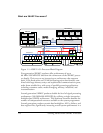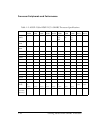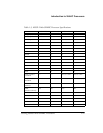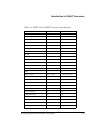
Getting Started With SHARC Processors 1-7
Introduction to SHARC Processors
variety of applications. This capability is especially relevant in consumer,
automotive, and professional audio where the algorithms related to stereo
channel processing can effectively utilize the SIMD architecture.
Third generation SHARC products employ an enhanced SIMD architec-
ture that extends CPU performance to an impressive 400 MHz/2.4
GFLOPS. These products also integrate a variety of ROM configurations
and audio-centric peripherals designed to decrease time to market and
reduce the overall bill of materials costs. Third generation SHARC audio
processors feature a high level of integrated on-chip peripherals, such as
multichannel audio surround sound decoders and postprocessing algo-
rithms, S/PDIF transmitter/receiver, high performance asynchronous
sample rate conversion, PWM channels, code security, and DTCP cipher
for protection of digital data in automobiles. A number of third genera-
tion processors are also pin compatible for use with a single hardware
platform. This increased level of performance and peripheral integration
allow third generation SHARC processors to be considered as single chip
solutions for a variety of audio markets.
Fourth generation SHARC products not only increase the core perfor-
mance to an industry-leading 450 MHz/2.7 GFLOPS but also boost the
performance with the addition of accelerator blocks implementing the
FIR, IIR, and FFT functions to off-load core activities from being con-
sumed by filter processing. Fourth generation SHARC processors
integrate some of the highest memory on-chip RAM with a capacity of
5M bits. Extra memory capacity is further enhanced with the innovative
VISA (variable instruction set architecture) mode where programs can save
up to 30% of code size by reducing the opcodes for many instructions. For
industrial and automotive applications, fourth generation processors also
incorporate a thermal diode to allow customers the flexibility to operate in
higher ambient operating temperature conditions without sacrificing on
overall performance. DTCP cipher for protection of digital data in auto-
motive applications is also integrated in automotive parts.


















